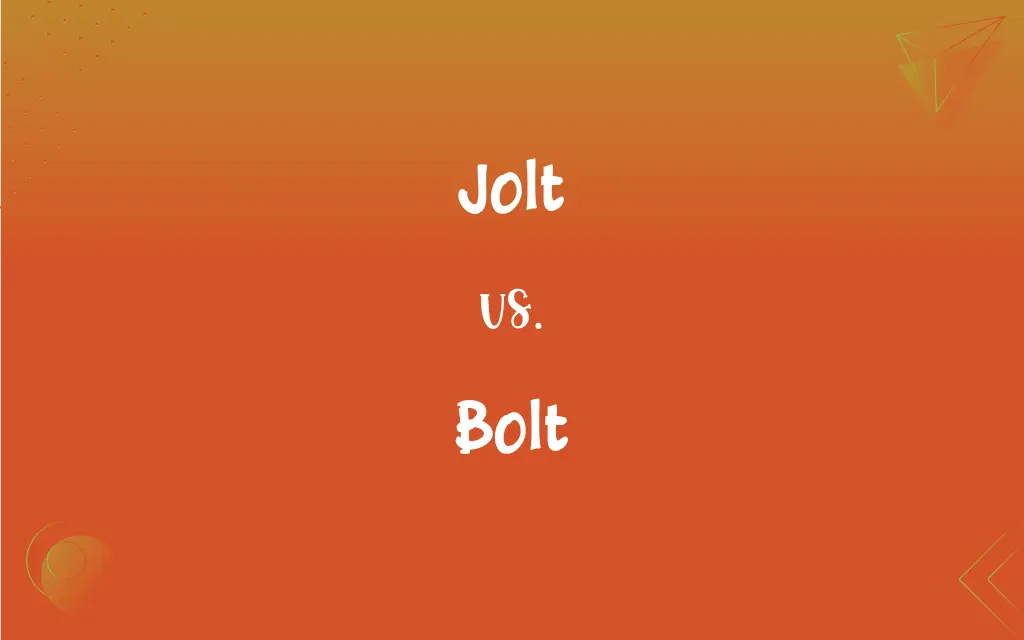Jolt vs. Bolt: What's the Difference?
By Aimie Carlson & Harlon Moss || Updated on March 4, 2024
A jolt is a sudden shock or surprise, often physical or emotional, while a bolt refers to a fast run or a metal fastener.

Key Differences
A jolt refers to a sudden, sharp movement or feeling, often resulting from an unexpected event or impact. It can describe physical movements, such as being shaken or jolted by a bump in the road, or emotional reactions, such as being jolted by surprising news. In contrast, a bolt can either describe a sudden, quick dash, especially when trying to escape, or a cylindrical piece of metal used to fasten things together. The term "bolt" is versatile, indicating both action and object, depending on the context.
Jolts are commonly associated with experiences that cause a quick and often unpleasant surprise or shock. This can include anything from a physical jolt felt during turbulence on a flight to the emotional jolt of hearing unexpected news. Bolts, on the other hand, when used to describe motion, imply speed and directness, as in bolting towards the door, or, when referring to hardware, they denote strength, security, and permanence, such as bolting a shelf to the wall.
The concept of a jolt is inherently tied to reactions—physical or emotional—that are involuntary and induced by external stimuli. It emphasizes the suddenness and often the brief intensity of the experience. Whereas the action of bolting highlights a deliberate, swift movement made by a person or animal, and the object bolt underlines the idea of securing or fastening something firmly.
In everyday language, "jolt" is often used metaphorically to describe things that stimulate or energize, such as a jolt of caffeine. This metaphorical use underscores the term's association with invigoration and suddenness. Conversely, "bolt" in its noun form is a standard term in construction and mechanics, symbolizing reliability and the concept of joining or anchoring, with no common metaphorical use akin to "jolt."
The physical sensations or reactions described by a jolt can be both negative and positive, sometimes even exhilarating, such as a jolt of excitement. In contrast, bolting, as an action, usually conveys urgency or a need to escape, and as a noun, it conveys solidity and fixedness, showing how each term carries distinct connotations and practical implications in real-life scenarios.
ADVERTISEMENT
Comparison Chart
Definition
A sudden, sharp shock or movement.
A fast run or dash; or a metal fastener.
Context
Emotional or physical reactions.
Action of moving quickly or hardware.
Connotations
Surprise, shock, invigoration.
Speed, security, fastening.
Usage in Language
Often metaphorical (e.g., a jolt of energy).
Literal, relating to movement or fastening.
Physical vs. Emotional
Can describe both physical and emotional experiences.
Primarily physical, either as action or object.
ADVERTISEMENT
Jolt and Bolt Definitions
Jolt
It describes a quick, sharp movement.
The train's abrupt stop gave the passengers a jolt.
Bolt
A bolt is a fast, sudden run.
The rabbit made a bolt for the bushes.
Jolt
A jolt is a sudden shock or surprise.
The car hit a pothole, giving us all a jolt.
Bolt
As hardware, it's a metal fastener.
We need a bolt to secure this beam.
Jolt
In machinery, a jolt can indicate a sudden malfunction.
The printer's jolt signaled a paper jam.
Bolt
Bolting implies moving quickly.
He bolted from the room after the announcement.
Jolt
To move or dislodge with a sudden, hard blow; strike heavily or jarringly
Jolted his opponent with a heavy punch.
An impact that jolted the mailbox loose.
Bolt
In construction, a bolt joins two objects.
The frame is held together with bolts and nuts.
Jolt
To cause to move jerkily
Stops and starts that jolted the passengers.
Bolt
Bolt can also mean to secure something firmly.
Bolt the door to keep it from swinging open.
Jolt
To put into a specified condition by or as if by a blow
"Now and then he jolted a nodding reader awake by inserting a witty paragraph" (Walter Blair).
Bolt
A bar made of wood or metal that slides into a socket and is used to fasten doors and gates.
Jolt
To make suddenly active or effective
The remark jolted my memory.
Bolt
A metal bar or rod in the mechanism of a lock that is thrown or withdrawn by turning the key.
Jolt
To disturb suddenly and severely; stun
She was jolted by the betrayal of her trusted friend.
Bolt
A fastener consisting of a threaded pin or rod with a head at one end, designed to be inserted through holes in assembled parts and secured by a mated nut that is tightened by applying torque.
Jolt
To proceed in an irregular, bumpy, or jerky fashion.
Jolt
A sudden jarring or jerking motion, as from a blow.
Jolt
A sudden, strong feeling of surprise or disappointment; a shock.
Jolt
The cause of such a feeling
His resignation was a jolt to the whole staff.
Jolt
A brief strong portion
A jolt of whiskey.
Jolt
(transitive) To push or shake abruptly and roughly.
The bus jolted its passengers at every turn.
Jolt
(transitive) To knock sharply
Jolt
(transitive) To shock (someone) into taking action or being alert
Jolt
(transitive) To shock emotionally.
Her untimely death jolted us all.
Jolt
(intransitive) To shake; to move with a series of jerks.
The car jolted along the stony path.
Jolt
An act of jolting.
Jolt
A surprise or shock.
Jolt
To shake with short, abrupt risings and fallings, as a carriage moving on rough ground; as, the coach jolts.
Jolt
To cause to move with a sudden motion, especially an up and down motion, as in a carriage going over rough ground, or on a high-trotting horse; as, the horse jolts the rider; fast driving jolts the carriage and the passengers.
Jolt
To stun or shock a person physically, as with a blow or electrical shock; as, the earthquake jolted him out of bed.
Jolt
To stun or shock or change the mental state of (a person) suddenly, as if with a blow; as, the sight of the house on fire jolted him into action; his mother's early death jolted his idyllic happiness.
Jolt
A sudden shock or jerk; a jolting motion, as in a carriage moving over rough ground.
The first jolt had like to have shaken me out.
Jolt
Something which causes a jolt{2}; as, the bad news was a jolt.
Jolt
A sudden impact;
The door closed with a jolt
Jolt
An abrupt spasmodic movement
Jolt
Move or cause to move with a sudden jerky motion
Jolt
Disturb (someone's) composure;
The audience was jolted by the play
Jolt
Jolts can be emotional, like a sudden scare.
The horror movie gave me quite a jolt.
Jolt
Jolts can be invigorating, like a sudden burst of energy.
I need a jolt of caffeine to wake up.
FAQs
What is a jolt?
A jolt is a sudden, sharp movement or feeling, often caused by an unexpected event.
Is a jolt always negative?
No, a jolt can be negative or positive, such as the jolt of excitement or adrenaline.
How is a bolt used in construction?
In construction, a bolt is used to fasten or secure objects together, ensuring stability and strength.
What does it mean to bolt?
To bolt means to run quickly or suddenly, or it can refer to a type of metal fastener.
Can "jolt" refer to emotional experiences?
Yes, "jolt" can describe sudden emotional reactions, such as surprise or shock.
How does the context change the meaning of bolt?
The meaning of "bolt" changes with context: it can mean a quick escape or movement, or refer to a cylindrical fastener.
Can "bolt" be used in a non-physical context?
"Bolt" is primarily used in physical contexts, either as a quick movement or as a hardware term, and is not commonly used metaphorically.
What materials are bolts made from?
Bolts are usually made from steel, stainless steel, brass, or aluminum, depending on their required strength and resistance to corrosion.
Can both "jolt" and "bolt" be used figuratively?
"Jolt" is more commonly used figuratively (e.g., a jolt of energy), while "bolt" is typically used in its literal senses.
What's the difference between a jolt and a bolt in terms of movement?
A jolt refers to an involuntary, sudden movement or shock, whereas bolting refers to the deliberate act of running quickly.
What are common uses for bolts?
Bolts are commonly used in mechanical and construction applications to securely fasten materials together.
How do you choose the right bolt for a project?
Choosing the right bolt involves considering the material, size, strength, and environmental conditions to ensure durability and safety.
Can jolts be harmful?
Physical jolts can be harmful, causing injury or discomfort, especially if they are intense or the body is not prepared for them.
How does a jolt affect electronic devices?
A physical jolt can disrupt electronic devices, potentially causing short circuits, dislodging components, or leading to data loss.
What are the differences between screws and bolts?
Screws are typically tapered and designed to cut into the material they are being screwed into, while bolts are not tapered and are used with nuts to fasten materials together.
Why is bolting an important safety feature in construction?
Bolting is crucial in construction for creating strong, secure connections between components, ensuring structural integrity and safety.
Is a jolt similar to a vibration?
While both can be sudden, a jolt is a single sharp movement or shock, whereas a vibration is a rapid back-and-forth motion.
What is bolting behavior in animals?
Bolting behavior in animals refers to sudden, fast running, often as a flight response to perceived threats or danger.
Why might someone feel a jolt while driving?
A jolt while driving can be caused by hitting a pothole, sudden braking, or abrupt acceleration, leading to a physical shock or movement.
Can jolts have psychological effects?
Yes, emotional or psychological jolts, such as receiving unexpected news, can have lasting impacts, including stress or changes in perspective.
About Author
Written by
Aimie CarlsonAimie Carlson, holding a master's degree in English literature, is a fervent English language enthusiast. She lends her writing talents to Difference Wiki, a prominent website that specializes in comparisons, offering readers insightful analyses that both captivate and inform.
Co-written by
Harlon MossHarlon is a seasoned quality moderator and accomplished content writer for Difference Wiki. An alumnus of the prestigious University of California, he earned his degree in Computer Science. Leveraging his academic background, Harlon brings a meticulous and informed perspective to his work, ensuring content accuracy and excellence.































































